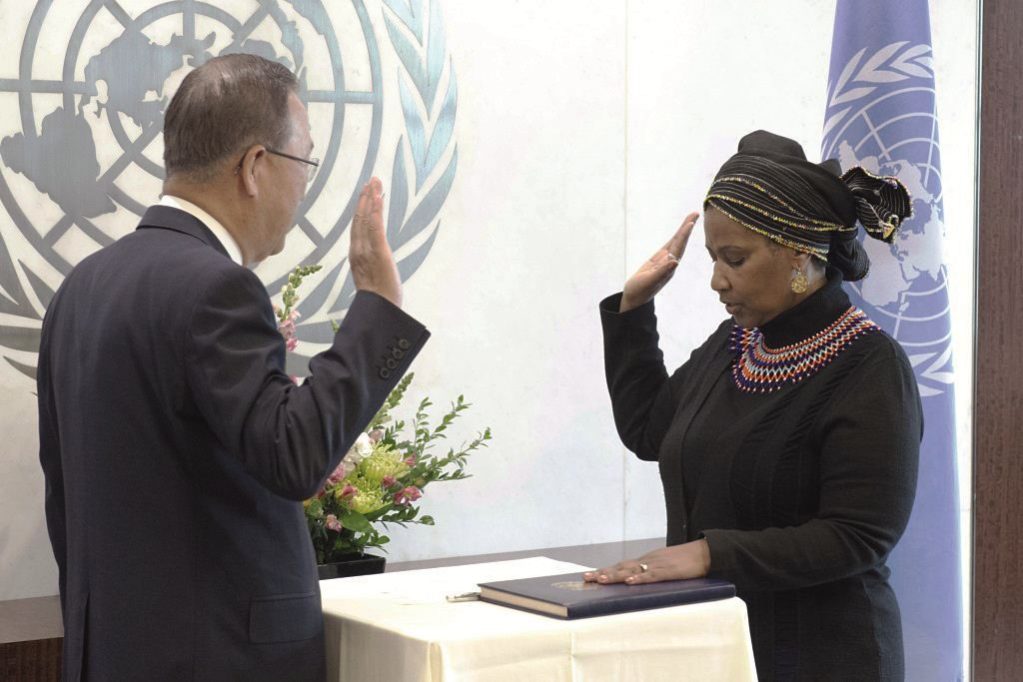More than five years ago, she found herself on the wrong side of history when South Africa’s ruling party opted for leaders whom it believed would be more connected to the country’s poor and working class.
But now Phumzile Mlambo-Ngcuka, who has been in the background since then, has been appointed as a leader of the world’s largest bureaucracy, the United Nations (UN).
For the next four years, she will serve as the executive director of the UN Entity for Gender Equality and Empowerment of Women, known colloquially as UN Women.

“It’s always been a defining feature for me, that if anything works, it must work for women. I have always known that this is my benchmark and I must get there as quickly as possible… If I cannot facilitate change, God forbid!” she says.
Loading...
The body, which was formed in 2010, is tasked with promoting women’s rights and their participation in global affairs. UN Women can boast some successes, such as helping women gain seats in seven national elections, and reforming laws and policies in 26 countries to increase women’s access to economic assets and social protection.
But Mlambo-Ngcuka has her work cut out for her. Although there are calls, which she supports, to develop a stand-alone UN goal to achieve gender equality, the organization faces serious challenges, including inadequate funding.
Also, in a time when the world has to deal with economic uncertainty, more than often, budget cuts negatively affect the progress of women and entrench gender inequalities.
Mlambo-Ngcuka joins a list of women who were shining stars in former South African president Thabo Mbeki’s cabinet and have since left the country to take up international positions… Mlambo-Ngcuka, African Union Commission chairperson Nkosazana Dlamini-Zuma and special envoy on gender at the African Development Bank, Geraldine Fraser-Moleketi, could all, arguably, in their own right lead South Africa.
However, the experience Mlambo-Ngcuka gained while she served in government, and her well-known
tenacity, will now be put to use on the global stage.
She insists Africa will be a priority, but not at the expense of other regions.

“When you think about Africa, the first thing that comes to your mind is poverty. And yet there’s a lot of good things in Africa… I want for us to start picturing a different Africa and bring forward that Africa does have resources. That there is a fighting spirit that we need to harness,” she says.
Mlambo-Ngcuka is not alone in her approach. For far too long, Africa has been depicted as the begging bowl of the world , a perception that Dlamini-Zuma also wants to remedy.
Mlambo-Ngcula says she plans to work closely with Dlamini-Zuma, as well as Africa’s two women presidents, Ellen Johnson Sirleaf from Liberia and Malawi’s Joyce Banda.
“I would want to go to these women on the issues I’m going to be pushing forward as they relate to Africa. I actually want to harness their stature and the influence they have to make a push. Also, I will need them in working with the other leaders in Africa.”
There are strategic countries on the continent whose buy-in Mlambo-Ngcuka will have to get, such as Nigeria, with its wealth of powerful and influential women.
Women across the world face a multitude of challenges, which change in severity depending on where they live and what their social standing is. Mlambo-Ngcuka believes that if she can improve the quality of education and reproductive health, her time at the UN will not have been wasted.
“One of the things that is uniquely disabling sometimes to women, is failure to address their reproductive health. Women have an unwanted baby when they are not ready to support the child. You trigger inter-generational poverty and the life of that woman comes to a standstill. So allowing women to reach their full potential without having to deal with the responsibility of having a family they have not planned for, is, for me, very important.”
Mlambo-Ngcuka took office in August 2013 and has a number of initial ideas on how she will improve UN Women. When her predecessor, former Chilean president Michelle Bachelet, resigned to focus on politics, she was criticized in some quarters for not leaving much of a legacy. Some of this was blamed on her role being confined to raising awareness about women’s living conditions and UN Women having no executive powers.
“I don’t want to be all gung-ho right at the beginning, and maybe create that vibe for myself, but really, I am also concerned. I cannot leave my country to be a token. We need to do something that is destiny-changing for women.

“In my discussions with UN secretary general Ban Ki-moon, he made it very clear it is important that we make an impact on women. I am hoping that I can lean on him and when it turns out actually that there isn’t scope for that, I can go and speak to him.”
Mlambo-Ngcuka’s strategy is not to reinvent the wheel, but to build on what people are currently doing. Her aim is to give UN Women a much stronger presence and make sure that women’s issues are more visible.
“I want to make sure women are in your face… I just feel our voice is a bit muzzled, a bit timid. And I feel that this is one time where you want to lead from the front.”
Loading...
